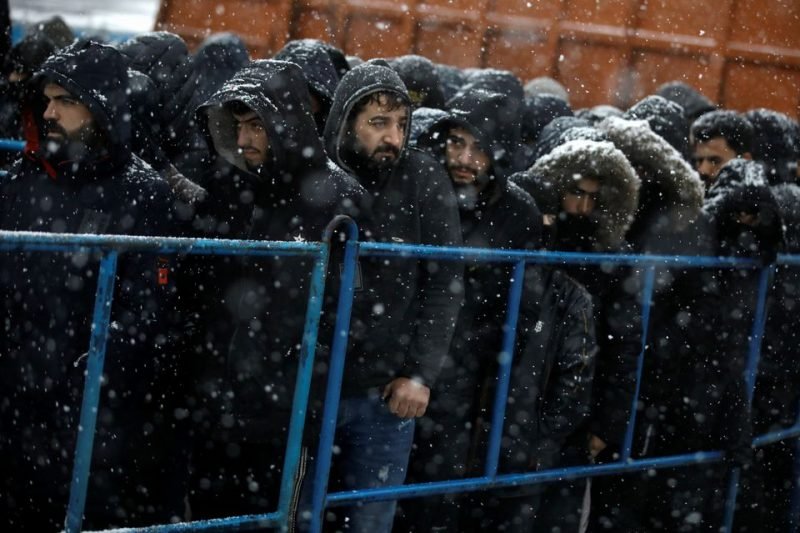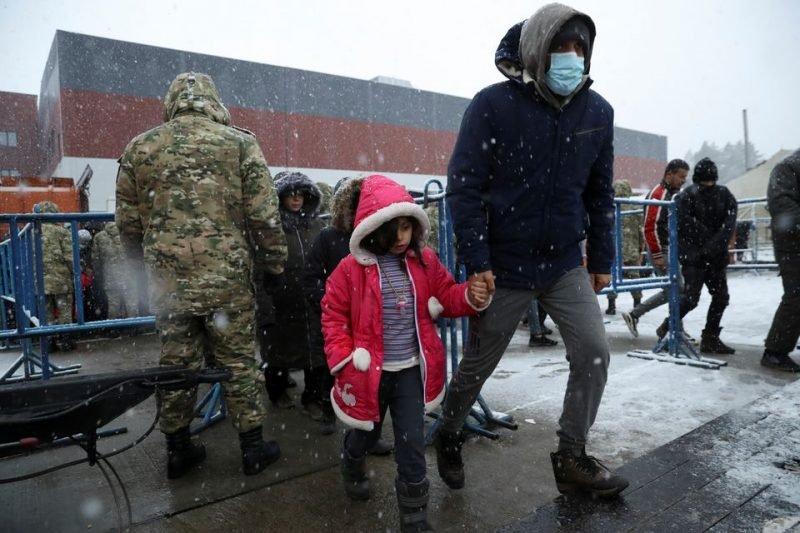EU vows unity on Belarus as Poland flags more border incidents

Thousands of people stranded on the European Union’s eastern border represent an attempt by Belarus to destabilize the bloc, rather than a migrant crisis, and as such call for a coordinated response, the head of EU executive said on Tuesday.
Ursula von der Leyen told the European Parliament the 27-nation bloc was standing in solidarity with Poland, Lithuania and Latvia, who are bearing the brunt of what the EU says is President Alexander Lukashenko’s ploy to engineer a crisis by flying in migrants into Belarus and then pushing them across EU borders.
“It is the EU as a whole that is being challenged,” von der Leyen said. “This is not a migration crisis. This is the attempt of an authoritarian regime to try to destabilise its democratic neighbours.”
Polish Prime Minister Mateusz Morawiecki said Warsaw’s diplomatic efforts were helping reduce the numbers of migrants travelling to Belarus in the hope of entering the EU, but Poland and its neighbours warned the border crisis was far from over.
Morawiecki, speaking after meeting the leaders of Hungary, the Czech Republic and Slovakia in Budapest, said Poland had been in talks with the governments of Iraq, Turkey, Uzbekistan and others.
Poland, at loggerheads with Brussels over accusations it was subverting the rule of law, has also been reaching out to its European partners.
A government spokesman tweeted Morawiecki would meet French President Emanuel Macron on Wednesday and Polish media reported plans for meetings with German Chancellor Angela Merkel and British Prime Minister Boris Johnson.
Reuters was unable to immediately confirm the meetings with Merkel and Johnson.
Travel companies blacklist
Von der Leyen said the EU was also coordinating its response to Lukashenko’s challenge with its non-EU partners – the United States, Canada and Britain.
To deter intermediaries transporting migrants to Belarus from helping Minsk, the EU would create a blacklist of travel companies involved in trafficking and smuggling of migrants, she said.
It would provide the EU with a legal tool to suspend or limit the operations of companies, or even ban them from the EU if they were engaged in human trafficking, according to EU Commissioner Margaritis Schinas.
“This is not a migration crisis, this is a security crisis,” Schinas noted. According to the EU, over 40,000 attempts to enter the EU via the Belarus border were prevented in 2021.
The EU hit Belarus with sanctions after Lukashenko’s violent crackdown on protests against his disputed re-election last year, and Brussels earlier this month agreed to expand those to airlines, travel agencies and individuals involved in the movement of migrants.

Change of tactics
Minsk cleared migrant camps at the border and agreed to the first repatriation flights in months last week and on Tuesday reported that about 120 migrants had left on Nov. 22 and more were due to follow.
But authorities in Warsaw said repeated incidents at the border showed Minsk may have changed tactics but had not given up plans to use migrants fleeing the Middle East and other hotspots as a weapon in the stand-off with the EU.
Border Guard spokesperson Anna Michalska said about 50 migrants tried to cross on Monday evening, with 18 briefly making it across the barbed wire barrier.
Another group of similar size gathered but ultimately gave up an attempt to cross at another location.
“There are repeated attempts to cross the border and they will continue,” Stanislaw Zaryn, a spokesperson for Poland’s special services, told reporters.
Polish authorities estimate about 10,000 or more migrants could be still in Belarus, he said, creating the potential for further problems.
Lukashenko, who denies the allegation that he fomented the crisis, has pressured the EU and Germany in particular to accept some migrants while Belarus repatriates others, a demand the bloc has so far flatly rejected.
Humanitarian agencies say as many as 13 migrants have died at the border, where many have suffered in a cold, damp forest with little food or water as winter sets in.
Reuters was present when Syrian siblings who had crossed into Poland from Belarus were detained by border guards near the town of Siemiatycze on Tuesday, as the first snow of the winter fell on the forests around the frontier.
In a stark reminder of the human toll of the crisis, the imam of the Polish village Bohoniki buried on Tuesday an unborn child who died by the Polish-Belarusian border in the womb of its mother.
Halikari Dhaker’s mother miscarried him while she, her husband and their five children crossed the border through dense forests and wetlands.
Reporting by Pawel Florkiewicz, Anna Wlodarczak-Semczuk, Alan Charlish, Jan Strupczewski, Marine Strauss, Sabine Siebold, Andrius Sytas, Yara Abi Nader, Marko Djurica, Fedja Grulovic, Stephan Schepers, Felix Hoske, Sergiy Karazy, Andreas Rinke; Writing by Tomasz Janowski; Editing by Angus MacSwan and Alex Richardson


















